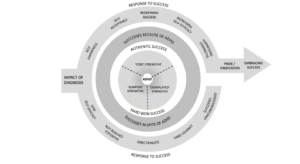This blog is a lay summary of research conducted by the Birkbeck alumna and career coach Tamsin Crook and Professor Almuth McDowall.
Research focus
This research offers a positive-focused exploration of ADHD adults’ perceptions of their career-based strengths and successes. The paper reframes the predominantly pathologised view of ADHD, offering important insight and guidance for coaching professionals working with neurominority clients, presenting nuanced, relatable narratives for the ADHD community.
Methodology
We interviewed seventeen participants, all self-identifying as successful in their careers. We used the feedforward interview technique (FFI), which focuses on positive experiences and ‘high points’ to elicit empowering personal narratives. We found this a very useful technique for qualitative research with a neurominority.
Core themes
Findings revealed two core themes:
- the paradoxical nature of strengths;
- career success as an evolving narrative. Participants expressed achieving career success ‘in spite of’ and ‘because of’ their ADHD.
ADHD strengths
Participants described their strengths in three ways:
- ‘Core strengths’ seemed to be particularly attributed to their ADHD, such as spontaneity, making connections, and justice sensitivity:
| “The things we ADHDers do best are the things that we do out of an emotional response…” |
- ‘Adaptive’ strengths such as hyperfocus, altruism, humour, and resilience were often described as a response to trickier elements of the ADHD condition:
| “…by helping other people knock down their barriers, I am mothering the ghost of the girl I used to be.” |
- ‘Overplayed strengths’, such as autonomy and energy:
| “As soon as you get momentum with ADHD, it’s amazing where you can go. But the momentum works both ways… if you get in a bad place, it’s very easy to go down.” |
Career success
The participants had a range of responses to the concept of career success. It was interesting to combine these into a visual model with an evolving narrative, ranging from a fundamental difficulty in recognising their success, through to confidently embracing their achievements and future potential, often moderated by the diagnosis of ADHD and the self-awareness that it brought. It was clear that participants felt that their most authentic successes occurred *because of* their ADHD; successes achieved *in spite of* their ADHD had been hard-won.

| “I do think that the biggest difference came when I accepted my strengths and found strategies for my weaknesses… when I stopped trying to fit into boxes I wasn’t going to fit in…” |
Implications for practitioners
- FFI is a very effective and accessible method for accessing personal narratives which doesn’t need training beyond good listening skills and understanding how to ask the questions with participants who might have experienced throwbacks as well as success.
- Career coaches can use this balanced, pragmatic, strength-based approach to enable each individual to better understand their ADHD, develop personal agency and succeed, both subjectively and objectively in their careers.
More Information
